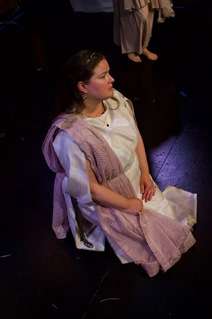|
Back
Rape Revisited on the Opera Stage This Year New York
The Sam, Flea Theater
05/02/2019 - & May 4*, 5, 2019
Benjamin Britten: The Rape of Lucretia, Opus 37
Allison Gish (Lucretia), Stan Lacy (Tarquinius), Helena Brown (Female Chorus), Erik Bagger/Victor Khodadad* (Male Chorus), Eva Parr/Julia Tang* (Bianca), Andrew Dwan (Collatinus), Scott Lindroth (Junius), Barbara Porto (Lucia)
Modus Opera Orchestra: Ryu Cipris (Flute), Boris Baev, Keve Wilson (Oboe), Sam Boutris (Clarinet), Nanci Belmont (Bassoon), Meredith Moore (Horn), Melanie Genin, Kate Sloat (Harp), Brian Holman (Piano), Eric Borghi (Percussion), Eddie Findeisen, David Wei (Violins), Jarvis Benson (Viola), Eric Allen (Cello), Nathaniel Chase (Bass), Justin Bischof (Music Director)
Bea Goodwin (Stage Director), Luther Frank (Scenographer), Sarah Dixey (Costume Design)

A. Gish
New Camerata Opera presented a stunningly simple yet rich production of Benjamin Britten’s chamber opera, The Rape of Lucretia. Composition of The Rape of Lucretia quickly followed the worldwide success of Peter Grimes, whose premiere prompted productions at La Scala and the Metropolitan Opera. Instead of capitalizing on Grimes’ success, Britten set his sights on a smaller stage, and a vast historical context. While it was not immediately apparent, the themes of both operas were remarkably similar. In both, the central figures are squashed by the larger society around them, Grimes by his village, and Lucretia by the Etruscans takeover of Rome. Grimes is reviled by his neighbors. Lucretia is raped by the leader of the invading forces. Both Grimes and Lucretia internalize their victimization. Britten shows them looking at themselves as their oppressors did. The more vicious the society the more vicious the individual. Grimes takes it out on others and himself. Lucretia commits suicide.
Britten starts the opera with the offstage presence of Tarquinius Senior declaiming a mouthful of words which in Lucretia become his signature recitative, sung with a free rhythm pinned to the natural accents of words. Here melody uses few pitches.
Lucretia, Britten makes clear, is innocence itself. Allison Gish, accompanied by her maid Bianca, sung beautifully by Julia Tang, is in the end unable to fend off the new leader of Rome, Tarquinius. Ms. Gish sings Lucretia in full mezzo, subtly drawing her goodness.
As Tarquinius, Stan Lacy at first caresses the tulip-shaped lamp which hangs over Lucretia’s sleeping figure, and softly sings of the “frail crucible of light.” When he is rebuffed by the object of his desire, he rapes her as his vocal delivery become muscular and evil.
Punctuating recurring passages are performed by the orchestral ensemble consisting of a string quartet, flute (doubling piccolo and alto flute), oboe (doubling English horn), clarinet, bassoon, French horn, harp, piano with percussion and double bass. Sinister minor keys are selected for the Etruscan encampment. The colors of a summer night, including crickets and frogs, accompany the Male Chorus, a dynamic Victor Khodadad. Helena Brown as the Female Chorus had a remarkable variety in tone and emotion. The chorus of one is a unifying device and has the intriguing effect of enabling the audience as individuals to identify with the singular message of the many.
In Act II, the lullaby which accompanies Lucretia’s sleep full of dreams of her husband Collatinus, are pictured in the flute and clarinet combined with a muted horn and harp. Britten draws the scene in the innocent key of C Major which contrasts sharply with the troubled beginning of the Act. Andrew Dwan as Collatinus has a big bass voice and a large presence. Yet he is not able to overcome his wife’s sense that she is forever blemished by another person’s act.
The story of Lucretia was produced to powerful effect, with draped chiffons hanging from the ceiling and a clever use of light. The spare setting brought the music and the message clearly forward. This moving production displayed of one of Britten’s most beautiful operas.
Susan Hall
|